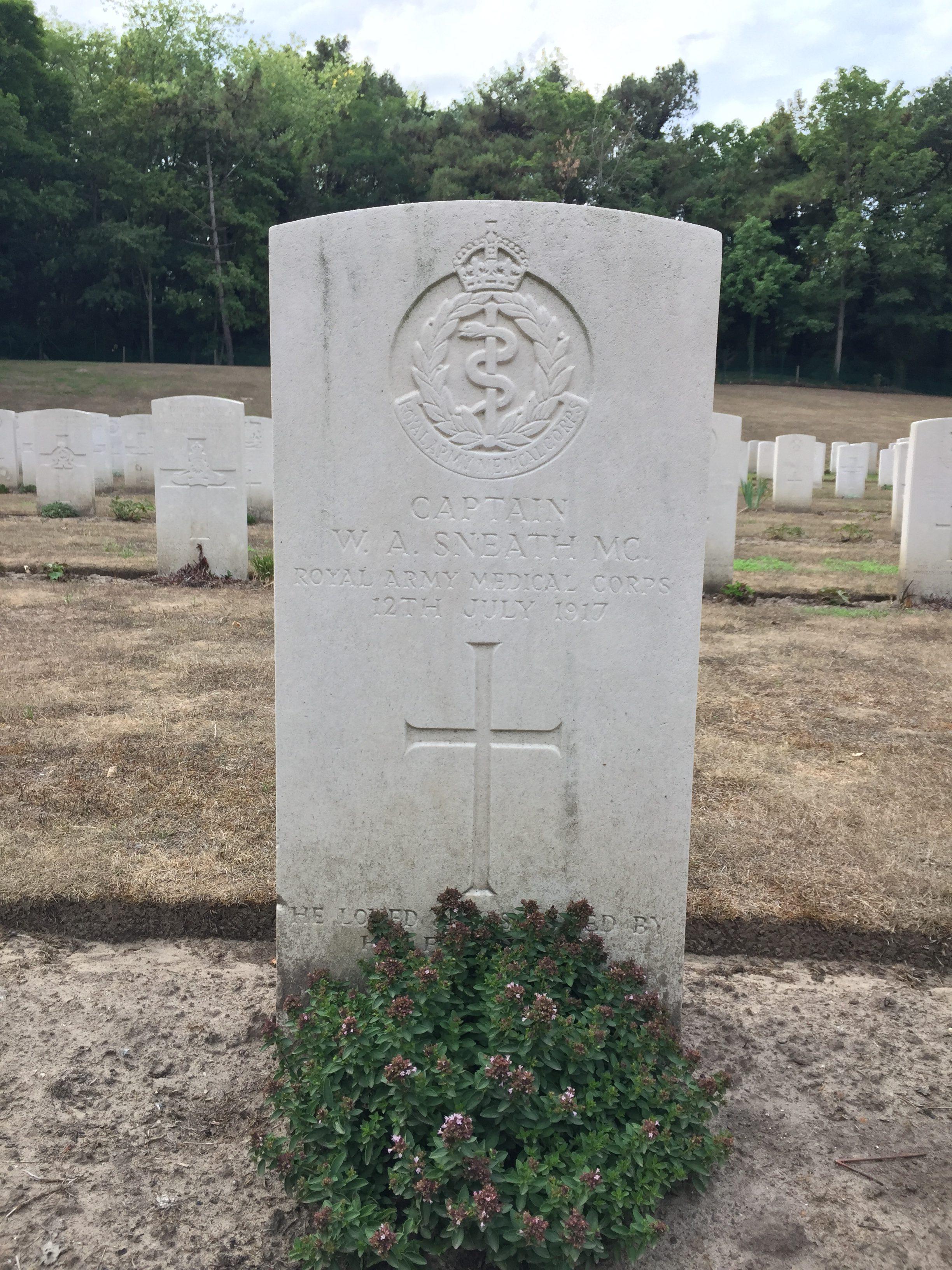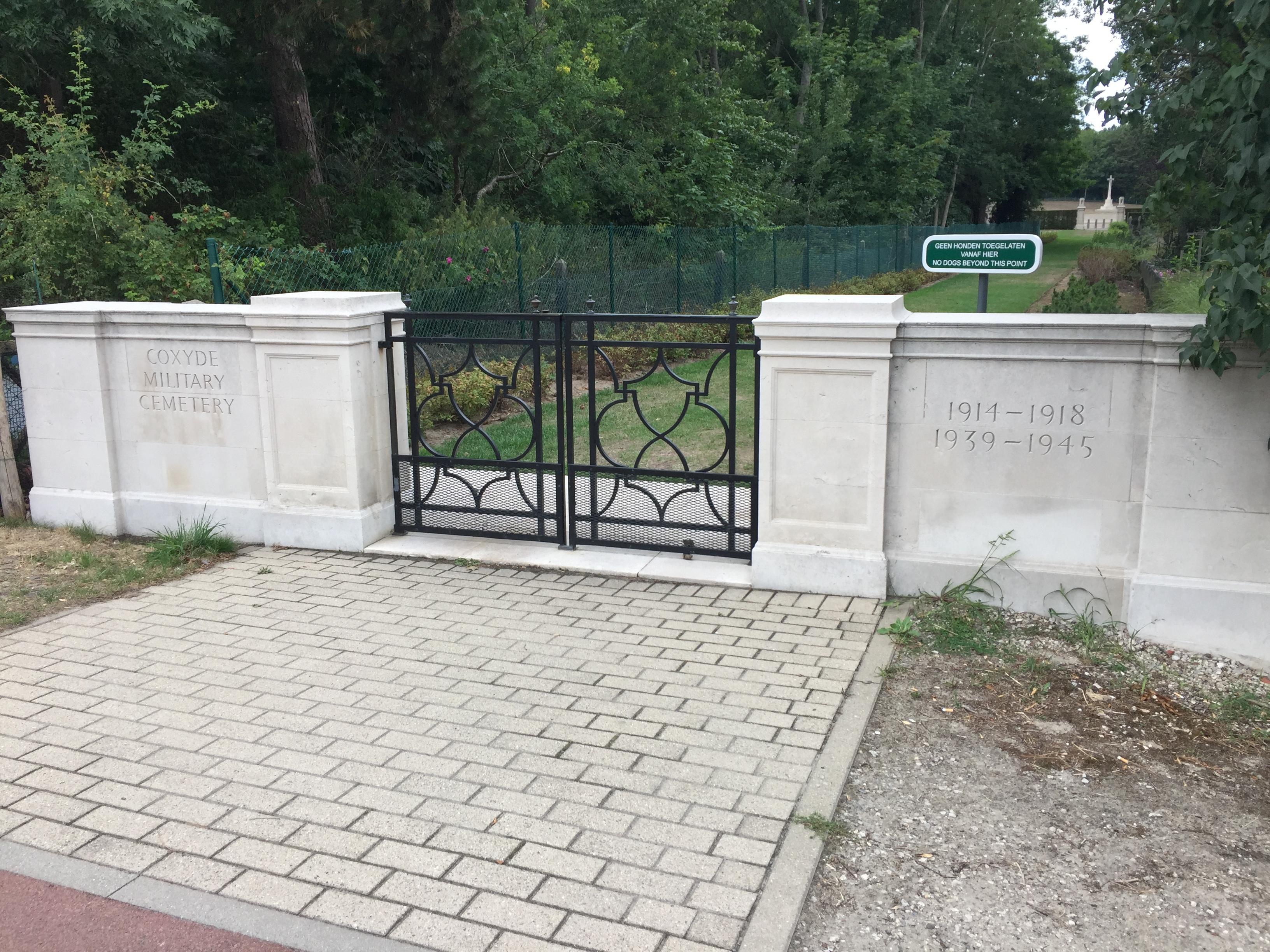Biography of Captain Wilfred Archer Sneath MC
2nd Field Ambulance, Royal Army Medical Corps
Died 12th July 1917
- Name: Wilfred Archer Sneath
Date of birth: 1888
Place of Birth: Witham on the Hill
Date of Birth Registration: January – March 1888
Place of Birth Registration: Bourne, Lincolnshire, England
- Name: Henry Andrews Sneath
- DOB: 1860
- Place of Birth: Thurlby, Lincolnshire, England
- Occupation: Corn merchant
- Name: Elizabeth Mary Garwood
- DOB: 1859
- Place Of Birth: Thurlby Lincolnshire, England
- Marriage: 1885 Bourne District
- Harry Garwood Sneath, 1886, Witham on the Hill
Wilfred Archer Sneath, 1888, Witham on the Hill
Alec Andrews Sneath, 1890, Witham on the Hill
- 1891: Wilfred is living with his parents in Northorpe Street, Thurlby, Lincolnshire
- 1901: Wilfred is living with his parents in Bottom Northorpe, Thurlby, Lincolnshire
- 1911: Wilfred is living with Samuel Smith Fox at 29 Park Range, Rusholme, Manchester. The census gives him an age of 23 and he is listed as a Demonstrator in Anatomy at Manchester University.
Relatives in services
- Wilfred’s cousin Eric Garwood also fought and were killed in WW1. Eric can be found on our page dedicated to the Thurlby War Memorial.
- No marriage for Wilfred has been found and because of his age we can assume that he never had the opportunity to marry.
Newspaper Mentions
- Lincolnshire Echo Friday 12th July 1914
THURLBY
Dr Wilfred Sneath son of Mr H A Sneath, of Thurlby has just obtained his degree of L.R.C.P. and M.R.C.S. Dr Sneath has for several year past been at Manchester.Grantham Journal Saturday 19th September 1914
THURLBY
WAR NOTES- A very successful Red Cross tea was held at the Manor House on Wednesday, at the kind invitation of Mrs Ward. About forty ladies were present and after tea needlework was distributed in the form of garments for our soldiers. Dr Wilfred Sneath left on Friday fro Headquarters at Aldershot to take up his work in the Royal Army Medical Corps.Grantham Journal Saturday 14th November 1914
THURLBY
RECRUITING – In connection with the county scheme for recruiting, in the school-room. The chair was filled by Mr H.A. Sneath and able speeches were made by Mr A.W. Dean of Dowsby, Mr. F.W. Raffety, London and Mr Dixon of Bourne. There of the popular young men of the village enlisted, viz., Mr Harry Fairchild, Mr George Griffin and Mr George Smith and we has hear there are others to follow. Dr W.A. Sneath who has been in hospital at Calais for the last two weeks has left for the front.Grantham Journal Saturday 21st November 1914
THURLBY
DR SNEATH IN FRANCE – In an interesting letter from Dr Wilfred Sneath (son of Mr H.A. Sneath of Thurlby), under date of November 1st, from the hospital Sophie Barthelot, Rue de Gambetta, Calais, he says:- “We have now get settled down very well, and have got about 120 beds opened. Later we hope to have 200. We are working very hard and doing with very little sleep. Last night I did three operations. At present we have only one operating theatre, but we have equipment for two, and shall have the other theatre when we get a room suitable. It is rather heart-breaking work here, as we get the very worst cases and many die within a few hours of admission. The number that we operate on is comparatively small, as ordinary bullet wounds in chest and abdomen do better if left alone, but the shrapnel and shell wounds are awful, and how the nurses do their work is a mystery. They are real heroines.”
During the course of his letter, Dr Sneath states that the Tommies cook their meals. He relates the routine of hospital work, which shows that they are very busy, and he adds that the wounded arrive at all times, mostly at night. “As for the news of the war, we get very little here, save what the wounded soldiers tell us. For The rest we are dependent upon English newspaper, which arrive at six o’clock.” Dr Neath says that he is very fit. It is interesting to note that this Hospital de Calais is endowed and maintained by the corn merchants on Mark Lane and Baltic.British Medical Journal Impressions Of A Civilian At The Western Front.
MILITARY CROSS
Temporary Captain Wilfred Archer Sneath, M.B., F.R.C.S., R.A.M.C.
He was out every night tending the wounded under fire. On one occasion he went out two hundred yards in advance of our front line and dressed a wounded man under machine-gun fire, afterwards bringing him in.Western Morning News Saturday and Liverpool Daily Post 23rd September 1916
WOUNDED
Temp. Cant. W. A. Sneath, M.B., F.R.C.S., R.A.M.C.Grantham Journal Saturday 14th July 1917
THURLBY
FROM THE FRONT.- DEATH OF CAPTAIN W.A. SNEATH, M.C., R.A.M.C. – The news reached Mr H. A. Sneath on Saturday that his son Capt. W.A. Sneath, M.C., R.A.M.C., was wounded on the day following his return from his recent leave. Captain Sneath was returning from a tour of inspection with two officers, when a shell burst wounding him seriously and the two accompanying him slightly. Yesterday (Friday) the sad intention came that Captain. Sneath had succumbed to his injuries in a Belgian Hospital just behind the lines. IN a letter received from a follow officer, a tribute is paid to Captain Sneath’s popularity among officers and men of the regiment to which he was attached -“The Welsh” writes the officer, “think there is no one in the world like the old Doc!” Corpl. Leonard Parker has since his recent arrival at the eastern front been in hospital, but is now out again and it is hoped his health is re-established.FRANCE”S DAY
There will be a flag at Grantham next Saturday in aid of the French Red Cross work.
CAPT W A SNEATH., M.C., R.A.M.C. DIES OF WOUNDS.
Grantham people will hear with very great regret of the death from wounds, arising from shell fire in France, of Captain Wilfred A Sneath, M.C., R.A.M.C. It will be remembered that he had a brilliant career at the Grantham Technical Institute and an equally successful record as medical student at the Manchester University. As an officer of the R.A.M.C., he had done most effective service in France and was rewarded one time ago with the Military Cross. Quite recently he was home on leave and he received his injuries on the day following his return to duty while on a tour of inspection with two officers. The greatest sympathy will be felt for his father Mr. H. A. Sneathof Thurlby.The Nottingham Evening Post Monday 16th July 1917
DIED OF WOUNDS
CAPT W.A. SNEATH, M.C.
News has been received by his father, Mr. H. A. Sneath of Thurlby, that his son, Captain W. A. Sneath, M.C., R.A.M.C., had died of wounds arising from shell fire in France. The deceased officer had a brilliant career at Grantham Technical Institute and an equally successful record as a medical student at Manchester University. As an officer of the R.A.M.C., he had rendered most effective service in France and was rewarded, some time ago, with the Military Cross. Quite recently, he was home on leave and he received his wounds the day following his return to duty, while on a tour of inspection with two officers. The later were only slightly injured.Manchester Evening News Friday 20th July 1917
LOSSES AMONG OFFICERS AND MEN
Casualties among officers reported today include the following:
KILLED
Capt WILFRED A. SNEATH, M.B., F.R.O.S., R.A.M.C., was an assistant to Dr Cheetham, of Ashton-upon-Lyne. He has been in the army since the outbreak of war. He was mentioned in despatches and awarded the Military Cross for gallantry while tending wounded.Grantham Journal Saturday 21st July 1917
THE DEATH OF CAPT. SNEATH, R.A.M.C.
As we reported is our last issue Captain Wilfred A. Sneath has died of wounds in Belgium. His death is a great loss, not only to his friends and relatives but to the country, for he was a man of exceptional promise and ability. Born at Bowthorpe Park in 1888, Capt Sneath was educated at Thurlby Board School and the Grantham Technical Institute. From the latter School he proceeded to Manchester University in 1906 with the Kesteven Major Scholarship and the Dalton Entrance Scholarship in Mathematics. At Manchester he had brilliant career, being the most promising medical student of his time, He won in succession the Dauntosey Medical Scholarship, the Tom Jones Exhibition in Anatomy, the Junior and Senior Platt Physiological Exhibitions, the University Prize for 2nd M.B. Subjects, the Turner Medical Scholarship, the Bradley Surgical Scholarship, the Clinical prize in Surgery at the Manchester Royal Infirmary, the Agnew Scholarship for Diseases of Children, and graduate Scholarship on the results of the final M.B., C.H., B. For a year Capt. Sneath held the post of Demonstrator in Anatomy at the University, and for nine months House Surgeon at the Manchester Royal Infirmary. In October 1912, he went to the Dreadnought Hospital, Greenwich, as House Surgeon, and relinquished that post to take up private practice at Ashton-under-Lyne. On the outbreak of war he at once volunteered and was given a commission in the R.A.M.C. His career in the Army has been distinguished, as was his career in civil life. For two months he was stationed at Aldershot. and then took No. 19 Field Ambulance in France, remaining with the Belgian Army at Calais till March 1915. After a brief sojourn the Cambridge and Connaught Hospitals Aldersnot, he again went to France, this time as Medical Officer to the Durham Light Infantry. He was transferred to the Welsh, and while with that regiment he was mentioned in despatches (May 1916), an awarded the Military Cross “for conspicuous gallantry and devotion to duty” (August 1916). He was very proud of the Welsh, and they equally devoted to him. But duty called him to No. 1 Field Hospital and left the regiment with many regrets. Only few weeks ago Capt. Sneath was home on leave, and the wounds which terminated fatally were received the very day after he got back. It is sad to think that a life of such promise, and indeed already of such high achievement, should be cut short at the early age of 23. Not only was Capt. Sneath a brilliant surgeon and an able officer, but he was a man of singular beauty of character. He was distinguished by a simplicity of heart, by a winning disposition, by a humility and singleness of purpose, which drew cut the respect and affection of all who knew him. To these qualities all who worked with him—especially his brother officers— testify with one voice. To Mr. H. A. Sneath and his family we extend our sincere sympathy.The Scotman Thursday 26th July 1917
PREVIOUSLY REPORTED WOUNDED NOW REPORTED DIED OF WOUNDS.
SNEATH, CAPT. W.A., M.C., M.B., F.R.C.S., R.A.M.C.
Military Records
- None found
- These records show that Lieutenant (T) Wilfred Archer Sneath MC, Royal Army Medical Corps att 2 F Am was killed in action on 11th July 1917 in the Western European Theatre in France and Flanders.
Pension Records
- None found
Effects Left To
- Brother Rev. Alec Andrews Sneath
- The British Medal
The Victory Medal
The 15 Star
- Also rewarded the Military Cross
- UK:
- Thurlby, Roll of Honour in St Firmin’s Church
- Commonwealth War Graves Commission:
- In memory of Captain W A Sneath, MC, 2nd Field Amb, Royal Army Medical Corps who died on 12 July 1917. Age 30.
Son of Henry and Elizabeth Sneath of Thurlby, Bourne, Lincs.
Remembered with honour, Coxyde Military Cemetery.

© Picture taken by South Lincolnshire War Memorials

© Picture taken by South Lincolnshire War Memorials
- This is ongoing research and will be posted when completed
- WW1 Soldier’s Records (www.ancestry.co.uk)
Commonwealth War Graves Commission - British Newspaper Archive.